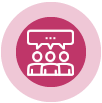Numerous organizations have been involved with the Network since 2014, including:
Foothills Academy Society
CanLearn Society
Calgary Board of Education
Calgary Catholic School District
Calgary Academy
Rundle Academy
Stoney Nakoda Education Authority
Tsuut’ina Education Department
Independent School Advisory Committee Calgary Regional Collaborative Services
Centre for ADHD Awareness, Canada (CADDAC)
University of Calgary
Werklund School of Education
Cumming School of Medicine
Owerko Centre
Mount Royal University
Southern Alberta Institute of Technology
Alberta University of the Arts
Bow Valley College
Learning Disabilities Association of Alberta
Learning Disabilities Association of Canada
AHS: Complex ADHD Treatment Clinic
AHS: CanREACH
Calgary Immigrant Womens’ Association
ADHD Parent Links
Hill Psychological Services
UDiscover Learning
Empower Me ADHD Coaching
Lighthouse Psychology Services
Macdonald Psychology Group
Compass Psychology
The Learning Disabilities and ADHD Network is a collaborative of a broad group of organizations and individuals, which is operated through Foothills Academy Society.

Network Manager
Carola Tiltmann is the Manager of the Learning Disabilities & ADHD Network and is also one of the Community Managers at Foothills Academy Estelle Siebens Community Services.
Carola brings her 30+years of experience as an educator and administrator in Alberta school systems to help families and students, manages the activities of the Network and acts as a Resource Navigator to the public with any issues related to Learning Disabilities & ADHD.

Advisory Committee
Members of the Network Advisory Committee are knowledgeable, capable, and passionate individuals from across the public, private, and nonprofit sectors in the Calgary Region who have a deep commitment to supporting the needs of people with Learning Disabilities &/or ADHD. The Advisory Committee has a fluid membership, based on the availability and priorities of interested individuals/organizations.
Experience and Expertise Shared Around the Table
The Learning Disabilities & ADHD Network has been meeting and collaborating since the 1980’s, when it was originally known as the LD Stakeholders Group. Member organizations of this long-standing Network regularly present at conferences and provide workshops and courses on the topics of Learning Disabilities, ADHD, and related topics. We undertake research projects in the field, collaborate with each other on various initiatives, and jointly develop content for the Network. Most importantly, we have shared our professional, personal, and family experiences about Learning Disabilities & ADHD – and we have learned tremendously from each other.
In 2018, Calgary Region LD & ADHD Network was proud to be nominated for a Spirits of Gold “Together We Can” award through Calgary & Area United Way for the collaborative nature of our initiative.
We are people whose lives have been touched by Learning Disabilities & ADHD, and whose life’s work has been to support individuals who struggle with learning and attention challenges.
The Calgary Region Learning Disabilities & ADHD Network fosters collaborative action toward more effective and coordinated responses to meet the needs of people with Learning Disabilities (LD) & Attention Deficit Hyperactivity Disorder (ADHD).
Vision
Individuals with Learning Disabilities and/or ADHD will have the necessary support, resources and opportunities within the Calgary region to be successful and thrive.
Goals
To encourage communication and collaboration among groups and organizations that serve the Learning Disabilities & ADHD population in the Calgary Region.

To provide individuals and families with guidance for navigating services in the Calgary Region.

To support community access to accurate knowledge about Learning Disabilities and ADHD in order to increase public awareness.

To provide information about evidence-based practices in identification and intervention for the Learning Disabilities & ADHD population.
Strategic Priorities
The Learning Disabilities & ADHD Network has identified strategic priorities that align with our goal and main aims, with the desired outcome to help improve the lives of people with Learning Disabilities (LD) and/or ADHD in the Calgary Region. We are working together to achieve these outcomes.
To learn more about Strategic Priorities the Network has identified and organizations in the Calgary Region that are contributing to these outcomes, take a look these documents:
- early assessment, diagnosis and treatment
- educational supports
- workplace accommodations
- Improve Teacher Training
- Subsidize Learning Disability Assessments for Children
- Improve Training in ADHD for Health Care Providers
- Improve Awareness of the Duty to Accommodate for Employers
Ensuring A Sustainable Future
for Alberta Youth with
Learning Disabilities and ADHD
White Paper
What is Advocacy?
Quite simply, making sure your concerns are heard by those in a position to do something about them.
That generally means finding someone at the decision-making level who directs policy, funding and resources. It also means that just a few people at this level will have to listen to many voices but will choose to address only a few issues.
To have your voice stand out from among so many, you will:
- probably feel a bit nervous at first! That’s ok – this might be new for you;
- focus on just one issue but know that one really well;
- advocate more than once – it’s all about repetition.
Myths, misinformation, misunderstanding and stigma surround Learning Disabilities and ADHD despite decades of research and the availability of evidence-based interventions and treatment. This impacts you and those around you causing confusion, frustration, under-diagnosis, barriers to treatment and intervention, and stress…a lot of stress. Stigma also results in many remaining quiet about the significant impact of LD or ADHD on their lives.
When their constituents remain silent on the issues, politicians and decision-makers see no need to learn about these conditions, consider the impact of these challenges or make changes to policy.
Politicians need to be informed!
You need to be heard!
Advocacy efforts succeed when voices like yours are noticed. Parents, grandparents, extended family members, friends, individuals, educators and medical professionals, you can all add your voices to the effort to make Learning Disabilities and ADHD part of the political conversation.
Be Heard
Let politicians and policy-makers know why you are interested and why they should be interested in Learning Disabilities or ADHD. When meeting with government representatives, we are frequently told that they do not hear from their constituents on these topics; and they are, therefore, not overly interested in becoming involved.
Let’s get them interested! Here is a list of actions you can take to make your voice heard:
- Write/email a letter. We strongly encourage you to write/email a letter to your Member of the Legislative Assembly (MLA) of Alberta, as well as the Ministers of Education, Advanced Education, Children’s Services, Health, Mental Health & Addictions, Justice, Seniors, Community & Social Services, or any other ministries that you feel should be informed about the impacts of Learning Disabilities and ADHD.
Governments estimate that every letter they receive on a topic represents an additional 50 to 60 people also concerned about that topic who have not written a letter; so please know that your one letter is of great value.Also consider writing a letter to the editor of your local newspaper. If accepted, it will go out in print and online, reaching a wide audience.
- Have an Action Sheet ready (like the ones in our Advocacy Toolkit). These have facts you can quote and a list of commitments you want action on. When you are contacted by a candidate, polled for your opinion or you contact them, you can bring up your concerns without forgetting anything.
- Attend a townhall meeting, debate or constituent event where you can speak directly to a candidate or elected representative. Remember to bring along the Action Sheets (like the ones in our Advocacy Toolkit) to hand to them so they have information to refer back to.
If possible, organize others who are interested in these topics (for example: other families or friends) so the topics are brought up by more than one person. - Phone your local candidate or representative. Have your talking points ready (like the ones in our Advocacy Toolkit or the White Paper) with your facts, personal experiences (optional but powerful) and your requests. If you do not get to speak to them immediately, an office administrator will pass on your message.
- Request a meeting. Come prepared with your talking points (like the ones in our Advocacy Toolkit or the White Paper). It sends an important message that you have taken the time to be prepared, taken the time to travel and taken the time to meet. However, also be prepared with knowing that it is unlikely that your candidate or representative will agree to change anything during your meeting but ask them to commit to looking into your concern, and ask them to let you know what they discovered. Be ready to follow up!
Network Grants Awarded to Members of the Network Advisory Committee

The Calgary Region Learning Disabilities & ADHD Network (the “Network”) has the strategic goal identified as: Individuals with Learning Disabilities and/or ADHD will have the necessary support, resources, and opportunities within the Calgary region to be successful and thrive.
Funding is provided to Foothills Academy for the Network on an annual basis from an Anonymous Donor through the Calgary Foundation. These funds are utilized to fund the Network Manager role, as well as cover costs of the Network activities, such as the development and maintenance of the Network website.
On an annual basis, Foothills Academy Society intends to also make grants available to members of the Network Advisory Committee who want to work collaboratively to address issues in the LD & ADHD community. The amount of grants made available each year will be dependent on the continued support by the Anonymous Donor, and also informed by the other costs incurred by the Network.
Early Literacy Intervention:
The Benefit of Adding Parent Training to Fundations Reading Intervention
This project is providing support to children at risk of a diagnosis of a learning disability or difficulty developing reading skills by giving them explicit instruction in the building blocks of the English language. Strong reading skills are important for success in school, and also for long-term mental health. Parents play an important role in supporting their child’s early reading skills. This research study compares the benefits of three different options: an early reading intervention alone; parent training alone; and the combination of early reading intervention and parent training. Parents learn about how children learn to read (brain science), the sounds of all the English phonemes, how to blend those sounds together and how to pull them apart, how to identify vowel sounds in a word, and how to support their children’s emerging literacy skills. Furthermore, this gives families the knowledge they need to get their children assessed at earlier ages, gives them access to intervention to potentially lessen later academic struggles.
Network Members: Foothills Academy Read/Write Program, University of Calgary; Werklund School of Education
Parents! Participate in the study with your child.
Catch Them Before They Fail: (Re)Creating the Right to Read Screening Tool
The Right to Read Program, which includes the Reading Readiness Screening Tool (RRST) and an accompanying course for educators, was developed by the Learning Disabilities Association of Albert (LDAA) to support the identification of young children (kindergarten and grade 1) who are at risk for needing additional supports to build reading skills. Early screening of foundational literacy skills, in tandem with effective core instruction and intervention, is known to reduce the number of children who struggle with reading and writing.
Although the RRST and accompanying course has had much preliminary success and uptake throughout Alberta, given the recent modifications to the Alberta Education curriculum, the opportunity exists to update and expand the utility of the tool, and then also update the course accordingly. As a joint project, our goals are to: Update and revise the Reading Readiness Screening Tool (RRST) and associated testing and training materials; norm and validate the RRST so it will be included in Learn Alberta’s approved list for literacy assessments.
Network Members: Learning Disabilities Association of Alberta, Calgary Board of Education, Foothills Academy Society Professional Development, University of Calgary; Werklund School of Education
ADHD Vibes:
Pilot a virtual Behavioural Support Intervention for Children with ADHD.
The aim of this project is to assess the feasibility and impact of an online behaviour-management program for children with ADHD and their families. This program also aims to measure a variety of behavioural/mental health outcomes (e.g., parental and child stress, child depression and anxiety, and behaviour management) using self- and parent-report measures at three different specific time-points; pre-intervention, post-intervention (within seven days after completion of program), and at a two -month follow up after intervention.
Network Members: CanLearn Society, University of Calgary; Werklund School of Education and Cumming School of Medicine
Post-Secondary Success:
Navigating the Transition for Students with Attention- Deficit/Hyperactivity Disorder and Learning Disabilities Online Tutorial
The long-term goal of this project is to improve the transition to post-secondary and the retention rates of students. To achieve this goal, the project will design and pilot test a tutorial intended to prepare high school for the transition to post-secondary studies. The tutorial will be informed by the latest research on post- secondary transition for students with LD/ADHD and gather input from high school guidance counsellors and post-secondary staff. The tutorial will use an online learning platform for the curriculum. It will be self-guided and use appropriate accessibility tools (e.g., text to speech, dictation, immersive reader, overlays, picture dictionary, etc.). Topics for the learning modules are clearly outlined.
Network Members: Foothills Academy Society, University of Calgary; School & Applied Psychology
The Learning Disabilities & ADHD Network Website has been developed collaboratively by experts in the fields of Learning Disabilities, ADHD, Education, and other related topics. Advocates for people with LD & ADHD have been instrumental in ensuring the website is easy to navigate and the content is practical and relevant.
We’d like to extend our heartfelt gratitude to all the professionals in the Calgary Region who work diligently to ensure the website is a reliable and valuable resource.
Pam Lougheed – Educator
Network Project Manager 2018-2021 Literacy Specialist
Network: Advisory Committee, Education Team
Karen MacMillan – Registered Psychologist
Co-Executive Director of Foothills Academy Society
Network: Co-Executive Director of Learning Disabilities ADHD
Network Advisory Committee, Public Awareness Team
Simon Williams – Educator
Co-Executive Director of Foothills Academy Society
Network: Co-Executive Director of Learning Disabilities & ADHD
Network Advisory Committee, Education Team
Krista Poole – CEO
CanLearn Society; CEO
Network: Advisory Committee, Public Awareness Team
Sarah Hoag – Educator
Calgary Academy: Director of Learning – Junior School
Network: Advisory Committee, Education Team
Andria Slipp – Educator
Rundle Academy: Head of Literacy/Admissions Officer
Network: Advisory Committee, Education Team
Gord MacDonald – Educator
Calgary Catholic School District (CCSC): Diverse Learning Supervisor
Network: Advisory Committee, Education Team
Trisa Sorowski – Educator
Calgary Catholic School District (CCSC); Diverse Learning Supervisor
Network: Advisory Committee, Education Team
Gabrielle Wilcox – Registered Psychologist and Associate Professor
University of Calgary: Associate Professor at School & Applied Child Psychology; Werklund School of Education, Alberta Children’s Hospital Research Institute, Mathison Centre for Mental Health Research & Education, Hotchkiss Brain Institute.
Network: Advisory Committee, Assessment-Intervention Team
Deanne Robbins – Registered Psychologist
Alberta Health Services: Treatment-Resistant ADHD Clinic;
Psychologist Richmond Road Diagnostic & Treatment Centre
Network: Advisory Committee, Assessment-Intervention Team
Jody Wood – Educator
Current: Coordinator of Reading Pilots at CanLearn
Past: Learning Specialist with CBE
Network: Advisory Committee, Education Team
Don Andrews – Educator
Director of Student Services, Independent Schools Advisory
Committee (ISAC) Calgary and former Area RCSD (Regional Collaborative Service Delivery)
Network: Advisory Committee, Assessment-Intervention Team
Lorrie Goegan – Advocate
former LDAA, LDAC director
Network: Advisory Committee, Navigation Team
Jamie Gelfand – Advocate, Parent Support
ADHD Links Calgary – parent support group
Network: Advisory Committee, Navigation Team
Emma Climie – Registered Psychologist, Associate Professor & Researcher
University of Calgary; School and Applied Child Psychology at Werklund School of Education.
Associate professor, Director of Training, Director of Internships, Lead Researcher, Carlson Family ADHD Award
Network: Advisory Committee, Assessment-Intervention team
Mark Agius – Public Policy, Project Manager
Project Manager at Owerko Center within the Alberta Children’s Hospital Research Institute and Project Manager with Integrated Concussion Research Program.
Network: Advisory Committee, Public Awareness Team
Anne Price – Registered Psychologist
CanLearn Society: Psychologist
Network: Former Advisory Committee Member, Assessment-Intervention Team
Melanie Reader – Registered Psychologist
Foothills Academy Society: Manager; Psychological Services & Programs
Network: Assessment-Intervention Team
Lynde Hill – Registered Psychologist
Hill Psychological Services
Former Director of Psychological Services for the Learning
Disabilities Association of Saskatchewan
Former Associate Professor at University of Saskatchewan
Network: Assessment-Intervention Team
Janice Nelson – Communication Specialist
Foothills Academy Society: Manager; Communications and Fund Development
Network: Navigation Team
Krista Forand – Registered Psychologist
Compass Psychology Formerly psychologist with CanLearn Society
Network: Navigation Team
Jean Marks – Student Advisor
Mount Royal University; Post-Secondary Accessibility Advisor
Network: Navigation Team
Colleen Smereka – Advocate for adults with LD, ADHD
Former Post-Secondary Accessibility Advisor at SAIT
Network: Navigation Team
Jocelyn Ireland – Social Worker
Alberta Health Services: Social Worker with Highland Primary Care Network in Airdri
Network: Navigation Team
Tanya Keto – Provisional Psychologist & Educator
Foothills Academy: Community Services Manager; Professional Development & Community Education
Network: Consultant
Michael Zwiers – Registered Psychologist & former Educator
Lighthouse Psychology Current Adjunct Assistant Professor at University of Calgary
Network: Consultant
Sara Peden – Registered Psychologist
Psychologist in private practice Former psychologist with CBE
Network: Consultant
Dr. Dan Ross – Family Physician
Network: Consultant
Cathi Graveline – Assistive Technology Specialist
Foothills Academy: Assistive Technology Specialist
Network: Consultant
Disclaimer: The Learning Disabilities & ADHD Network does not support, endorse or recommend any specific method, treatment, product, remedial centre, program, or service provider for people with Learning Disabilities or ADHD. It does, however, endeavour to provide impartial and, to the best of our knowledge, factual information for persons with Learning Disabilities and/or ADHD.









